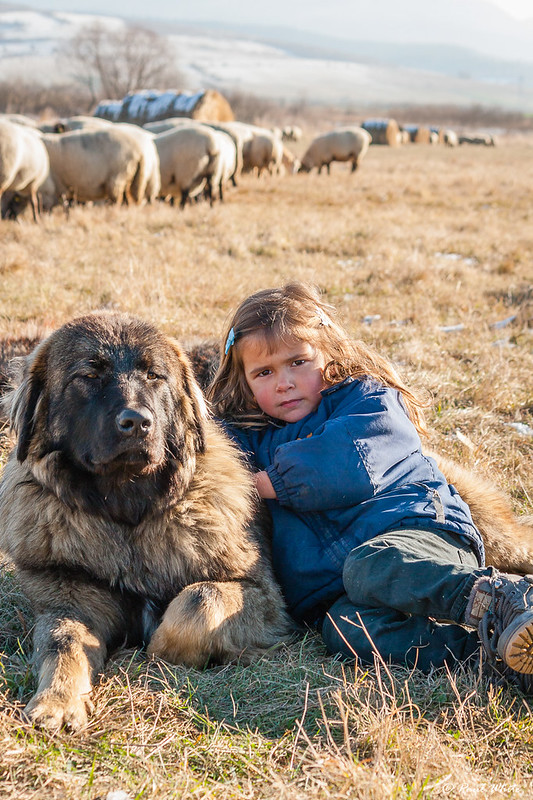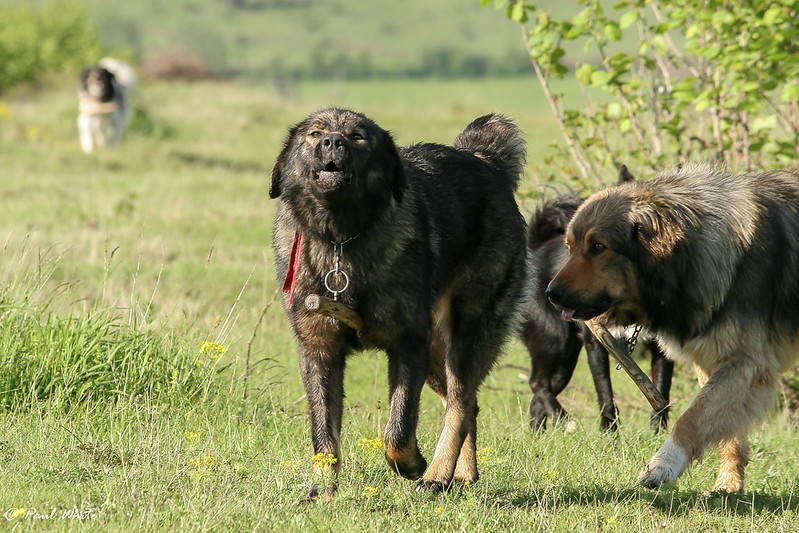by Paul White
This is Penge a working Šarplaninac shepherd dog with little Melinda. Penge's mother died when he was only 3 days old, so Tibor (Melinda's father) got the puppies to suckle from the sheep. This was Melinda's favourite puppy and she spent a lot of time bonding with and socializing him.

I personally know many livestock guardian dogs from several shepherd groups in Romania, and the way LGD puppies are raised and how this effects the way they work and behave as adults is of great personal interest to me.
I know that some farmers minimize human contact during a puppy's imprinting phase because they believe this will make them less effective guardians. Puppies are penned (corralled) with livestock when weened, often with an adult guardian to learn from. The only contact they have with a human is when they are fed or require immunizations. I have never seen this practiced in Romania and appears to have started when they were first introduced to the 'new world'.
Later they join the larger pack of LGD's without the presence of a human. The motive for removing the shepherd is reduce production costs, but personally I believe this is unfair on the dogs and a false economy in the long term. Livestock guardian dogs have evolved working alongside humans over many centuries. Without the direction of a shepherd, they are not corrected when required, can turn feral (leaving livestock unprotected), depredations can increase and sometimes the LGD's turn on the livestock themselves. I have been told first hand that this often leads to highly stressed, aggressive and unpredictable dogs. The initial high expectations of inexperienced farmers can quickly turn to disappointment followed by abandonment and ending in euthanasia.
The opposite approach is to allow puppies to mix with both livestock and humans (including children). I personally do not believe this has a negative impact on an LGD's ability to protect livestock and in fact makes for a more balanced and socialized dog.
Walkers have a genuine fear of passing flocks and herds where LGD's are working and there have been cases where attacks have occurred. You will still receive all the noise and threatening behaviour if you approach livestock too closely and are unknown to the dogs, but you are less likely to be bitten if a dog has been socialized with people as a puppy. One commentator noted: "I think that many shepherds hesitate to use LGDs exactly because they fear (liability in case of) attacks to humans."

I genuinely understand the fear farmers have regarding litigation which is why these powerful dogs need raising properly in the context of their work. It's important for inexperienced farmers deterring large predators to be supported with good and accurate information, including the correct way to raise their puppies. LGD's need to consistently make good and balanced decisions, like quickly determining the difference between real predatory threats to livestock versus passive humans walking by.
My personal findings and experience may be purely anecdotal, but I can say without bias that I feel much more comfortable around LGD's that have been well socialized from an early age around humans. Of course here in Romania a human shepherd is nearly always present with his dogs, so most puppies will have had direct contact with at least one human. But Tibor and several other shepherds I know go out of their way to socialize their dogs with a wide variety of people. This does take some extra effort for otherwise busy farmers, so they must observe positive results for them to invest this precious time.

In this area of Transylvania there's a low human population density with few leisure walkers, but that is not the case in many of those countries that are now introducing LGD's to counter the threat to livestock from wolves. Several countries in the European Union are transforming areas of land back to forestry from arable use as part of a continent wide rewilding program. This is to make for a more sustainable and nature friendly environment and already wolves have migrated all the way from Poland to Belgium.
However, many farmers and leisure walkers in these countries have not seen these dogs at work and are unaware how they protect their flocks from perceived danger. It's important for walkers to understand how to behave if confronted by LGD's, otherwise misunderstandings can occur. There's a lot of menacing and threatening behaviour involved when a wolf comes anywhere close to livestock, and dogs not properly socialized with humans may treat walkers in a similar way if they get too close.
If we are to give large predators a chance of remaining in these new and rewilded territories, LGD's will become an inevitable consequence and an essential part of the deterrence against large predator involved livestock depredation. People should not shy away from roaming the countryside on foot and will need to be kept onside which means keeping them and their pet dogs as safe as possible.
Free roaming LGD's guarding livestock on open land requires a new way of thinking for both farmers and walkers. This is the trade off between an apex predator free environment and a truly rewilded one. So using dogs that are as people tolerant/friendly as possible is so important for this to work.


